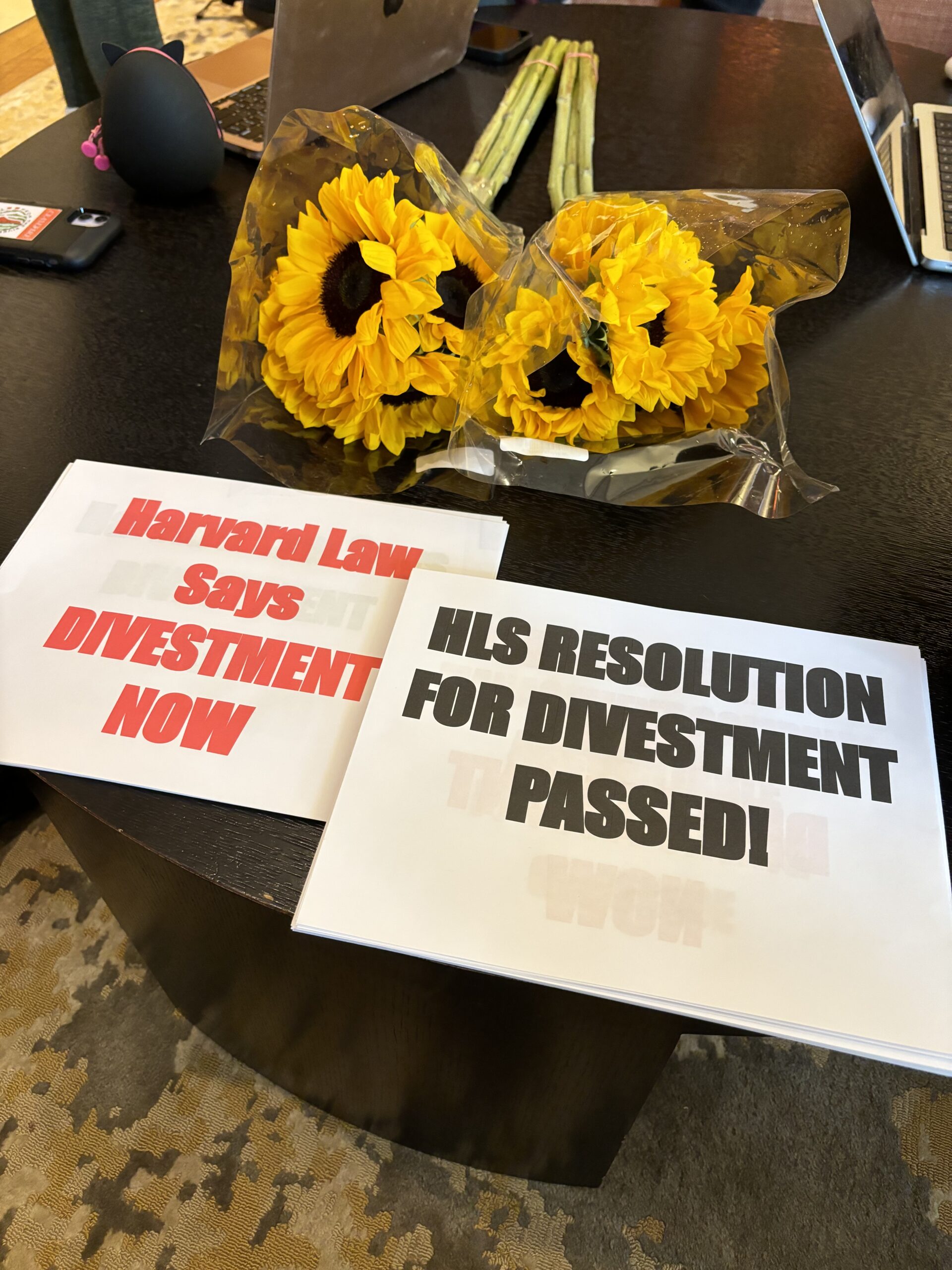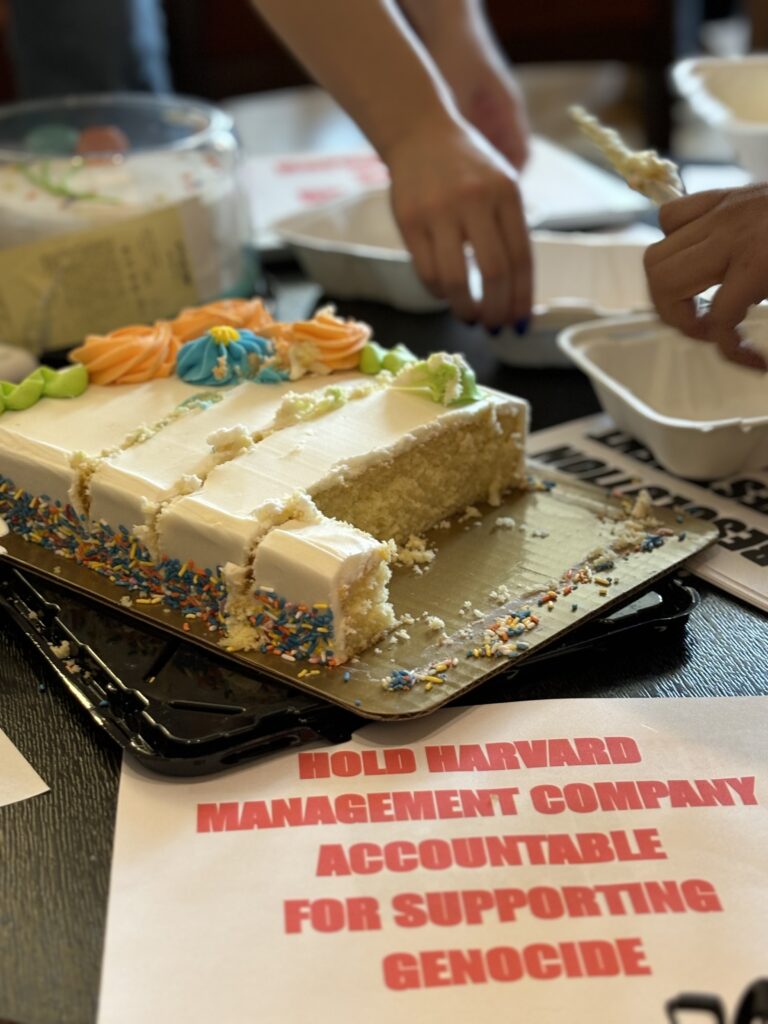
A resolution calling for Harvard’s divestment from Israel by the law school’s Student Council survived a procedural attack leveled against it hours after its initial passage in a 12-4 vote.
The council held an emergency meeting at 1:30 p.m., Friday to discuss whether proper procedure had been followed when it passed the new resolution, which called on Harvard to “divest completely” from entities associated with Israel’s alleged genocide against Palestinians. If procedural violations had been found, the resolution would have been void.
Opponents leveled two particular criticisms:
1) Opponents claimed the vote was not sufficiently publicized to meet the tenets of an open meeting, and votes cannot occur in closed meetings (Per Student Government (SG) Constitution Article I, Section 9.b)
2) Opponents claimed the bylaws were suspended without unanimous consent in order to vote secretly via Google form, thus invalidating the vote. (suspension requires unanimity per SG bylaws Section 7.3)
Students were given the opportunity to speak for a minute each during the hourlong open forum, presided over by co-presidents Tolu Alegbeleye, HLS ‘24, and Swap Agrawal, HLS ‘24.
One 1L critic of the process for passing the resolution claimed the vote was an illegitimate action within a closed meeting because using an anonymous Google form doesn’t allow for publishing the votes.
Some members of the Harvard Jewish Law Students Association (JLSA) said they did not receive a response when they asked for meeting links or minutes of the meeting once it had passed. One opponent of the resolution, JLSA co-president Erica Newman-Corre, HLS ‘24, said after requesting information about the vote via email during the week from voting and non-voting members, only two representatives responded.
Another 1L critic claimed the quorum for the SG to conduct business per their bylaws was not met.
Council member Vinny Byju, HLS ‘25, repeatedly refuted these claims, saying the process cohered with the SG Constitution and bylaws.
Byju said the vote at the initial meeting on the process for approving the resolution was addressed via amendment, not suspension, meaning that a two-thirds vote sufficed, per the constitution (SG Constitution, Article VI, Section 5; SG Bylaws Chapter 7, section 5). Second, Byju argued that quorum is defined with respect to members of a body meeting, and not applicable to any sort of voting process.
During this time, many students sympathetic to Palestine claimed the attacks on procedure to pass the resolution were mere pretext. They said opponents to the resolution were arguing in bad faith because they disagreed with the substance of the resolution, not the procedure by which it was passed.
Some supporters of the resolution, for example, contended that the vote was widely known about and that they did not perceive the vote as closed for that reason. Others, including co-president Swap Agrawal, HLS ‘24, remarked that the interpretation put forth by opponents of the resolution procedure would establish rules that would invalidate much of how the body has functioned without issue for multiple years (Google forms were widely used to conduct SG business during the height of the COVID-19 pandemic).
Others expressed frustration with the perceived hostility of the conversation and the broader divisiveness within the student body. To this, some students responded that such unity is not possible in light of the doxxing that has been occurring to predominantly Black and Brown students for the past six months.

The forum concluded with a vote by elected representatives on the validity of the procedure to pass Resolution No. R.-207-001. Confusion ensued on whether two members of Student Government could still vote despite their resignation earlier Friday. Regina De Nigris and Cameron Adkins, both 1L representatives, had stepped down because they “strongly disagreed with the resolution being considered by the Student Government.”
De Nigris contended that their resignation was contingent on the resolution being passed, and therefore they should still be allowed to vote on the fairness of the procedural process. Co-Presidents Alegbeleye and Agrawal ultimately allowed their votes to be counted.
The emergency meeting concluded with nine out of fourteen elected Student Government representatives affirming that the procedure to adopt Resolution No. R.-207-001 had been properly followed.
Though the full ramifications of the resolution have yet to be seen, campus pro-Palestinian groups are marking today as a victory.
“Where was your resolution condemning the deadliest attack on Jews since the Holocaust?” The question was posed in an Instagram post by the Harvard Alliance for Israel, which described the resolution as “morally wrong, antisemitic, and counter to the student government’s stated mission.”
“We thank our student government for representing the will of the student body,” the law school’s student organization for anti-Zionist Jews, HLS Tzedek, wrote in an Instagram post following the vote. “We condemn Harvard’s complicity in the ongoing violence, and hope the school honors the resolution swiftly.”

